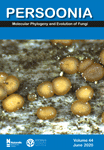
PERSOONIA
Scope & Guideline
Unveiling Insights in Ecology and Evolution
Introduction
Aims and Scopes
- Fungal Taxonomy and Systematics:
PERSOONIA aims to provide rigorous taxonomic and systematic analyses of fungi, emphasizing the identification and classification of new species and genera through morphological and molecular methods. - Phylogenetics and Evolutionary Biology:
The journal focuses on understanding the evolutionary relationships among fungal taxa through phylogenomic and multigene analyses, revealing insights into their evolutionary history and genetic diversity. - Biodiversity and Ecology of Fungi:
PERSOONIA publishes research that explores fungal biodiversity in various ecosystems, highlighting species richness, ecological roles, and interactions with host organisms. - Novel Discoveries and Descriptions:
The journal is dedicated to the discovery and formal description of new fungal species, contributing to the global knowledge of fungal diversity and promoting conservation efforts. - Integrative Taxonomy:
Utilizing an integrative approach that combines molecular, morphological, and ecological data, PERSOONIA seeks to resolve complex taxonomic issues and redefine species boundaries.
Trending and Emerging
- Phylogenomics and Genomic Analysis:
There is a significant increase in studies employing phylogenomic approaches, revealing deeper insights into fungal relationships and enhancing the understanding of their evolutionary history. - Cryptic Species and Biodiversity:
Research focused on cryptic species complexes is on the rise, highlighting the importance of molecular techniques in uncovering hidden diversity in well-studied taxa. - Impact of Climate Change on Fungal Diversity:
Emerging studies are beginning to address how climate change affects fungal distributions and diversity, reflecting a growing concern about ecological impacts. - Fungal Interactions with Hosts:
An increasing number of papers explore the complex interactions between fungi and their hosts, including parasitism and mutualism, which are critical for understanding ecological dynamics. - Integration of Multi-Disciplinary Approaches:
The trend towards integrative taxonomy is growing, combining genetic, ecological, and morphological data to provide a comprehensive understanding of fungal diversity.
Declining or Waning
- Traditional Morphological Studies:
Although morphological studies are still important, there is a noticeable decline in papers solely relying on morphological characteristics for species identification, as molecular methods gain precedence. - Niche-Specific Fungal Ecology:
Research focusing on niche-specific fungi, particularly in highly specialized habitats, seems to be less frequent, possibly due to a broader interest in general fungal biodiversity. - Fungi in Quarantine and Phytosanitary Contexts:
Investigations into quarantine fungi and their management are becoming less prevalent, which may reflect a shift towards more comprehensive biodiversity studies rather than specific regulatory concerns.
Similar Journals

Zoosystematics and Evolution
Unveiling the mysteries of species and their systems.Zoosystematics and Evolution is a premier peer-reviewed journal dedicated to the fields of animal science, zoology, and evolution, published by Pensoft Publishers. With a commendable Q1 ranking in multiple categories including Animal Science and Zoology, Ecology, Evolution, Behavior and Systematics, as well as Insect Science, this journal stands out as a vital resource for researchers and professionals engaged in the dynamic study of biodiversity and systematics. Since transitioning to Open Access in 2014, it has ensured that groundbreaking research is readily available to a global audience, thus fostering collaborative advancements and facilitating the dissemination of knowledge. The journal has a significant presence in both Scopus and various academic indices, enhancing its reputation and impact within the scientific community. Based in Bulgaria, at 12 Prof Georgi Zlatarski St, Sofia, the journal continues to thrive, contributing valuable insights that drive scientific inquiry and exploration in the ever-evolving realm of zoological research.

European Journal of Taxonomy
Bridging science and society in the realm of taxonomy.The European Journal of Taxonomy is a distinguished open access journal, published by the MUSEUM NATL HISTOIRE NATURELLE in France, dedicated to the rich and dynamic field of taxonomy, ecology, and systematics. Since its inception in 2011, this journal has aimed to provide a platform for the dissemination of high-quality research and innovative methods relevant to the study of biodiversity and species classification. With a commendable Q2 ranking in the Ecology, Evolution, Behavior and Systematics category as of 2023, the journal ranks 380 out of 721 in Scopus, highlighting its pivotal role in advancing scientific knowledge in these essential areas. Researchers and students alike will find valuable resources and contributions that address pressing ecological and evolutionary questions from 2015 to 2024. By promoting open access, the European Journal of Taxonomy ensures that vital research is accessible to a broader audience, fostering collaboration and discourse among professionals striving to enhance our understanding of the natural world.

NEW ZEALAND JOURNAL OF BOTANY
Exploring the Depths of Plant Science and EcologyThe New Zealand Journal of Botany, published by the esteemed Taylor & Francis Ltd, serves as a pivotal platform for disseminating significant research in the fields of Ecology, Evolution, Behavior and Systematics, as well as Plant Science. With a rich history dating back to 1963 and an impressive convergence extending to 2024, this journal has established itself as an essential resource for researchers and professionals dedicated to understanding the complexities of plant life and ecological systems in New Zealand and beyond. The journal is currently categorized in the Q3 quartile for both relevant disciplines as of 2023, reflecting its balanced influence within the global academic community. Although not an open access journal, it retains a significant impact factor, evidenced by its Scopus rankings, which place it within the top half of its categories. This makes it an invaluable tool for students, researchers, and academics aiming to engage with robust, peer-reviewed scientific findings and contribute to the evolving discourse surrounding botany and ecological research.
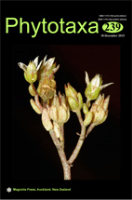
Phytotaxa
Advancing Knowledge in Botany and EcologyPhytotaxa, published by MAGNOLIA PRESS, is an esteemed journal in the fields of Plant Science and Ecology, Evolution, Behavior and Systematics. Established to cater to the growing need for high-quality research dissemination in botany, this journal presents the latest findings in plant taxonomy, systematics, and biodiversity. With its H-Index reflecting significant academic influence, and recognized as Q2 in Plant Science and Q3 in Ecology by Scopus, it stands as a reputable source for scholars and practitioners alike. The journal operates without open access restrictions, allowing for a wider reach to its audience. Positioned in New Zealand, Phytotaxa has been pivotal since its inception, contributing to the global understanding of plant diversity and ecology from 2010 to 2024. Its rigorous peer-review process ensures the high quality of published articles, making it an essential resource for researchers, professionals, and students dedicated to advancing the field of botany.
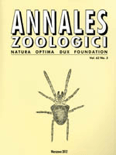
ANNALES ZOOLOGICI
Pioneering Discoveries in Zoological ResearchANNALES ZOOLOGICI is a distinguished academic journal published by the Museum & Institute of Zoology, Polish Academy of Sciences, based in Warsaw, Poland. With a long-standing tradition in zoological research, this journal has evolved to encompass a diverse range of studies in ecology, evolution, behavior, and systematics, aiming to foster a deeper understanding of animal biology and conservation. It holds a commendable Q2 classification in the 2023 Ecology, Evolution, Behavior and Systematics category, indicating its significant contribution to the field. Although ANNALES ZOOLOGICI is not an open-access publication, it remains accessible to a global audience of researchers, professionals, and students aiming to advance their knowledge and engage with cutting-edge zoological findings. As of 2024, this journal continues to be a vital resource for those eager to explore the complexities of animal life and contribute to ongoing discussions within this essential scientific discipline.

ARTHROPODA SELECTA
Unveiling the secrets of arthropod diversity.ARTHROPODA SELECTA is a prestigious journal dedicated to advancing the field of Ecology, Evolution, Behavior, and Systematics with a specific focus on arthropods, published by KMK Scientific Press Ltd in collaboration with Moscow State University. This journal, issued under the ISSN 0136-006X, has established its significance in the academic community by consistently providing high-quality research articles and reviews that contribute to our understanding of arthropod diversity and ecological significance. As evidenced by its classification in the Q2 quartile in both Ecology, Evolution, Behavior and Systematics and Insect Science categories as of 2023, ARTHROPODA SELECTA stands out for its rigorous peer-review process and impactful contributions to the field. Although it currently does not offer an open-access model, the journal ensures a broad dissemination of knowledge to researchers, professionals, and students alike. With a commitment to bridging gaps in existing literature and fostering interdisciplinary dialogue, ARTHROPODA SELECTA is a vital resource for anyone interested in the diverse and dynamic world of arthropods.
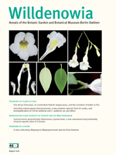
Willdenowia
Fostering interdisciplinary insights in plant biology.Willdenowia is a prestigious scientific journal published by the Botanischer Garten & Botanische Museum Berlin-Dahlem, dedicated to advancing the field of botany and plant sciences. With an ISSN of 0511-9618, this journal has established itself as a crucial platform for researchers, practitioners, and students interested in ecology, evolution, behavior, systematics, and plant science. The journal boasts an impactful reputation, evidenced by its impressive Q1 and Q2 quartile rankings in Plant Science and Ecology, Evolution, Behavior and Systematics respectively, as well as notable Scopus rankings, placing it within the top quartiles of its categories. Although access is not open, articles published in Willdenowia contribute significantly to the global body of botanical research, making it an essential resource for anyone looking to deepen their understanding of plant biology and related ecological disciplines. The journal has continuously evolved since its inception and aims to facilitate interdisciplinary collaboration and knowledge dissemination in the life sciences.

Mycosphere
Connecting researchers to the heart of fungal science.Mycosphere is a premier open-access journal published by MYCOSPHERE PRESS, dedicated to advancing the field of mycology and contributing significant insights into ecological and plant sciences. Established in 2010 and headquartered in Guiyang, China, this journal has carved out a vital niche, achieving remarkable rankings in the Scopus database—#3 in Ecology, Evolution, Behavior and Systematics and #4 in Plant Science, both boasting a 99th percentile ranking. With an unwavering commitment to disseminating high-quality research, Mycosphere serves as a critical platform for researchers, professionals, and students alike, encouraging robust dialogue and collaborations across the global scientific community. The journal's accessibility, coupled with its impact factor and Q1 categorizations in 2023 for both ecology and plant sciences, substantiate its role as an essential resource for cutting-edge studies and innovations in the field.

ORGANISMS DIVERSITY & EVOLUTION
Connecting Ideas: The Pulse of Evolutionary ResearchOrganisms Diversity & Evolution is a premier academic journal published by Springer Heidelberg, dedicated to advancing the fields of ecology, evolution, behavior, and systematics. Established in 2001 and continuing through 2024, this journal plays a crucial role in disseminating high-quality research that explores the complexities of biological diversity and evolutionary processes. With a commendable 2023 Scopus ranking of #253/721 in its category, placing it in the 64th percentile, and categorized in the Q2 quartile for Ecology and Evolution, it consistently attracts contributions from leading scientists and researchers worldwide. Although it operates on a subscription basis, the journal's rigorous peer-review process and dedication to impactful scientific discourse make it an invaluable resource for academics, practitioners, and students keen on understanding the intricate relationships that shape our biodiversity. By highlighting innovative research and fostering discussions on urgent ecological challenges, Organisms Diversity & Evolution serves as a vital platform for those committed to conservation and evolutionary biology.
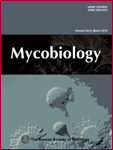
MYCOBIOLOGY
Fostering Collaboration in the World of MycologyMYCOBIOLOGY is an esteemed open-access journal published by Taylor & Francis Ltd, specializing in the fields of Infectious Diseases, Microbiology, and Plant Science. Since its inception, the journal has provided a platform for innovative research, showcasing a diverse range of studies that delve into the complexities of mycology and its vast implications on health, agriculture, and the environment. With a commendable impact factor and a Q2 ranking in Plant Science as of 2023, MYCOBIOLOGY facilitates the dissemination of vital findings to a global audience of researchers, professionals, and students. In addition to its commitment to high-quality content, MYCOBIOLOGY has embraced open access since 2018, ensuring that the latest advancements in mycological research are readily available to the academic community and the public. By bridging gaps in knowledge and fostering collaboration across disciplines, MYCOBIOLOGY plays a crucial role in advancing our understanding of fungal biology and its myriad applications.